 Editor's Choice Editor's Choice
Best Of The Month
June 2010
|
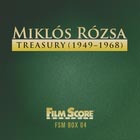
Miklos Rozsa Treasury, 1949-1968
FSM Box Set 4
15 CDs with booklet
Total Box Set Time = 19 hours, 12 minutes
Though it was released months ago, I am pleased to name this superb FSM box set
as Best Of The Month For June.
Please read Steve Vertlieb's rave review below on this page.
Once again, Rozsa Rules!
Rating: ****
--Roger Hall, Managing Editor, Film Music Review
A ROZSA TREASURY
Perhaps the most eagerly awaited event of the past year has been the much heralded release of an enormous box set of previously unreleased scores and soundtracks by the legendary golden age film composer and three time Oscar winner, Miklos Rozsa.
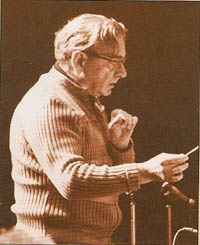
This sumptuous set of Rozsa recordings, produced by and for Film Score Monthly, is a prize of impressive proportions, comprised of many of the composer’s finest scores in the fabulously productive latter part of his astonishing career. Most of the work here is devoted to his extensive catalogue at MGM, while a generous number of soundtracks have been compiled and represented on compact disc for the very first time. Rarely has so extensive and exhaustive a compilation been so lovingly documented and presented, for here in this sumptuous package is a virtual treasury of musical legacy and pre-eminence by a master composer at the very peak of his creative talent, influence, and ability.
The post war era and 1950’s gave birth to a fertile explosion of artistic energy in the motion picture industry. Many of the screen’s most gifted and prolific directors and composers found their golden years a coming of age in rich exploration of their maturing genius. Hitchcock and De Mille reached the very pinnacle of their productivity during this period, while composers such as Miklos Rozsa and Bernard Herrmann sired a vital, brilliant new voice, unimagined either in the decades that preceded it or in those that followed. While Rozsa had expressed a unique, original style, and generously impressive body of work throughout the forties, his symphonic voice exploded in creative energy during his long tenure at MGM, culminating in the masterwork that became the brilliant Oscar winning score for BEN-HUR.
It was as if a calculated intellectual suppression of freedom had blown apart with the end of the Second World War, and been virtually reborn as the air cleared over Europe and The United States. There was an excitement, an exhilaration of the spirit, surging throughout the creative community. The arts exploded with new found artistic expression and unfettered imagination. The neo-realism of the post war era gave voice to an expression of unchained fury, as composers like Miklos Rozsa mined the raw underbelly of societal rage with such Mark Hellinger productions as BRUTE FORCE, THE KILLERS, THE NAKED CITY.
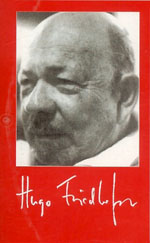
The flowering and reawakening of American life styles encouraged a new romanticism on the screen, while smoldering sexuality found passionate translation on film and in recordings. Golden Age composers such as Bernard Herrmann, Alfred Newman, Dimitri Tiomkin, Franz Waxman, and Hugo Friedhofer added their prolific voices to the raw musical energy dominating motion pictures of the nineteen fifties. Rozsa, Herrmann, and Tiomkin, in particular, seemed to reach their creative zenith during this artistic renewal, towering over the cinematic landscape like visionary giants, breaking new ground with ever increasing ferocity. Theirs was the combined artistic presence overwhelming the visionary splendor unspooling upon theater screens across the world, and much of this rich legacy of sound and imagery is preserved for the first time in legitimate representation by the stunningly beautiful treasury presented on compact disc by Film Score Monthly.
Nowhere is such passionate remembrance more expressively and eloquently imagined than in the opening tracks of the Treasury collection with the score for MGM’s 1949 production of MADAME BOVARY. Directed by Vincente Minnelli, the screen translation of Gustav Flaubert’s controversial novel was a seething, sexually charged morality play in which confused and complicit emotions conspire to undermine and eventually destroy their unwittingly decadent heroine. Rozsa’s score sensed the underlying tragedy of Emma Bovary’s plight and condemnation, filling the ears with passion and compassion, sadness and vitality. Rozsa had an uncanny ear for the longing and despair dancing visually upon the screen, and was able to express the power and ultimate destruction of the human spirit in lush musical terms, subtly conveying the desperation and futility of Emma Bovary’s degradation and emotional implosion. MADAME BOVARY marked the beginning of Rozsa’s signature “historical” period in which the culmination of his passion and artistry would find and bare hitherto unimagined fruit.
Returning to his neo-realism, cinema noir roots with John Huston’s 1950 crime drama THE ASPHALT JUNGLE for MGM, the dramatic and searing score by Rozsa helped to elevate this classic of the genre to near mythic heights and intensity. Rozsa’s electrifying themes tragically underscore the futility and desperation of a caper gone brutally wrong.
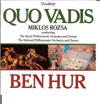 QUO VADIS, released by MGM in 1951, was perhaps the composer’s most ambitious score thus far, bringing the gladiatorial repression of Christianity by Rome vividly to life. While the presentation of QUO VADIS was often preachy and derivative, a thinly disguised remake of Cecil B. DeMille’s 1932 Paramount release THE SIGN OF THE CROSS, Rozsa embraced its thematic principles of faith and sacrifice with solemnity and fervor. This was a time of renewal for the composer, an artistic awakening of his own inner spirituality in which he would find explosive new avenues of musical composition, sired by a burning artistic intensity unparalleled in his career. Rozsa’s personal theological philosophy embraced music as his world and “religion.” In the historical and biblical thematic materials occupying his middle years, he seemed to have found inspiration, inner solace, and an immensity of maturing artistic expansion and culmination. While QUO VADIS was in many ways an unremarkable film, save for Peter Ustinov’s brilliant portrayal of Nero, its underlying message of faith and redemption served as the inspiration that would later reach its zenith with his individual masterpiece, BEN-HUR, for MGM in 1959.
QUO VADIS, released by MGM in 1951, was perhaps the composer’s most ambitious score thus far, bringing the gladiatorial repression of Christianity by Rome vividly to life. While the presentation of QUO VADIS was often preachy and derivative, a thinly disguised remake of Cecil B. DeMille’s 1932 Paramount release THE SIGN OF THE CROSS, Rozsa embraced its thematic principles of faith and sacrifice with solemnity and fervor. This was a time of renewal for the composer, an artistic awakening of his own inner spirituality in which he would find explosive new avenues of musical composition, sired by a burning artistic intensity unparalleled in his career. Rozsa’s personal theological philosophy embraced music as his world and “religion.” In the historical and biblical thematic materials occupying his middle years, he seemed to have found inspiration, inner solace, and an immensity of maturing artistic expansion and culmination. While QUO VADIS was in many ways an unremarkable film, save for Peter Ustinov’s brilliant portrayal of Nero, its underlying message of faith and redemption served as the inspiration that would later reach its zenith with his individual masterpiece, BEN-HUR, for MGM in 1959.
 THE STORY OF THREE LOVES is a forgotten gem from the vaults of MGM, a wonderful romantic trilogy from 1953 seducing the senses with tragic, and near tragic episodes featuring captivating performances by Kirk Douglas and James Mason as haunted souls on the verge of destroying not only themselves, but their loved ones as well. The score by Rozsa is a delight of romantic proportion and splendor.
THE STORY OF THREE LOVES is a forgotten gem from the vaults of MGM, a wonderful romantic trilogy from 1953 seducing the senses with tragic, and near tragic episodes featuring captivating performances by Kirk Douglas and James Mason as haunted souls on the verge of destroying not only themselves, but their loved ones as well. The score by Rozsa is a delight of romantic proportion and splendor.
YOUNG BESS remains one of the composer’s most glorious and spectacular works. Produced in 1953 by MGM, “Bess” is a richly romantic score, joyfully embracing its historically poignant story of love, betrayal and tragedy in England. Rozsa paints a luminous tapestry of human frailty and mythical lyricism in this lavish costume drama.
ALL THE BROTHERS WERE VALIANT, released by MGM the same year, was a rousing sea adventure bringing together the heroism and brotherly love of its pivotal characters, combined with the danger and ferocity haunting sailing vessels and their courageous crewmen of the period. Miklos Rozsa painted a vigorous, lyrical portrait of romance and adventure on the high seas in this exciting and valorous spectacle.
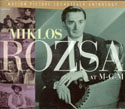
KNIGHTS OF THE ROUND TABLE, produced in 1953, was fairly typical of the historical swashbucklers being filmed by MGM at the time. Following their lavish production of IVANHOE, on screens a year earlier in 1952, the familiar tale of Lancelot and Guinevere found heroic rediscovery in this epic recreation of the Arthurian legend. Robert Taylor, who had earlier graced the screen as Ivanhoe, returned to enact the noble knight in this colorful costume drama. The score by Rozsa was exciting and imaginative, lighting the grandeur of valor and chivalry with the unmistakable flavor of the composer’s exhilarating, pulse pounding palette. The recording represented here is the rarely heard English album conducted by Muir Mathieson.
THE V.I.P.'S, released by MGM in 1963 has, sadly, been unable to survive its lurid reputation, due in part to the scandalous love affair and eventual marriage of its stars, Richard Burton and Elizabeth Taylor. Unfairly trashed as trite romantic drivel at the time of its release by its harshest critics, the picture is essentially a simple love story of irony and marital complacency conspiring to end what was, in its beginnings, a noble union. Rozsa’s powerful, romantic score is among his loveliest, exquisitely conveying the heartache of marriage in the final stages of emotional disruption. The music has endured, while the film that sired it has fallen into undeserved critical disrepair.
1968 saw the return of legendary science fiction producer/director George Pal to the big screen with a star studded film version of Frank M. Robinson’s prophetic fantasy novel, THE POWER. What might have become a classic of the genre was watered down by the studio into a tepid, turgid incarnation of an otherwise fascinating story. Pal, angered by the castration of his vision, admitted openly that MGM had forced him into production after the sudden cancelation of another film project which would have preceded it. Ill prepared to begin filming at this early stage of its evolution, Pal was forced to bite the bullet and make a film that he wasn’t prepared to produce. Embittered by the experience, his solitary joy involving the film was in enticing his friend and fellow Hungarian, Miklos Rozsa, to write a score which far exceeded the source and value of its inspiration. Pal rescued the original tapes of the soundtrack from the vaults at MGM, and proudly donated them some ten years later to The Miklos Rozsa Society. Happily, the music has survived the film it was derived from, and is dramatically represented in this outstanding anthology.
Proliferating this splendid succession of rare recordings are such lost treasures as THE RED DANUBE (1949), EAST SIDE, WEST SIDE (1949), THE MINIVER STORY (1950), CREST OF THE WAVE (1954), TIP ON A DEAD JOCKEY (1957), and SOMETHING OF VALUE (1957), while more classical traditionally known scores such as IVANHOE (1952) LUST FOR LIFE (1956), EL CID (1961), and KING OF KINGS (1961) are represented, either in their entirety or in part, in splendid profusion.
The Rozsa Treasury is encased in a handsomely produced box set from Lukas Kendall and his associates at Film Score Monthly. It is accompanied by a lavish, forty seven page program booklet featuring a generous selection of colorful photographs, and fascinating commentary by producer Lukas Kendall, together with film historian and musicologist Frank K. DeWald.
It is, in the end, a memorable achievement by all concerned, in reverent celebration of the life and music of Miklos Rozsa.
-- Steve Vertlieb, 21 June 2010
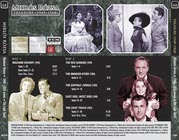
The Miklos Rozsa Treasury 15 CD Box Set may be obtained through
Screen Archives Entertainment
More Rozsa at FMR
Read Steve Vertlieb's tribute at
Remembrances of Rozsa
Also, the Rozsa Centennial in 2007...
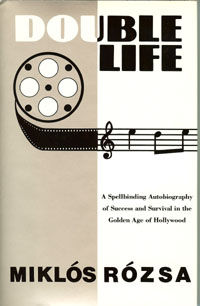
Miklos Rozsa Tribute

CD Review - MIKLOS ROZSA: A CENTENARY CELBRATION
Please help support
Film Music Review
Order your copy of
.jpg)

Film Music Review (Home Page)
Return to top of page

